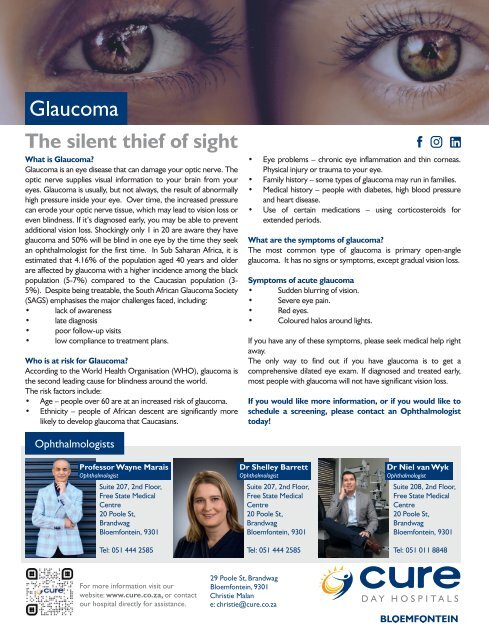Bloem - April 24
You also want an ePaper? Increase the reach of your titles
YUMPU automatically turns print PDFs into web optimized ePapers that Google loves.
The silent thief of sight<br />
What is Glaucoma?<br />
Glaucoma is an eye disease that can damage your optic nerve. The<br />
optic nerve supplies visual information to your brain from your<br />
eyes. Glaucoma is usually, but not always, the result of abnormally<br />
high pressure inside your eye. Over time, the increased pressure<br />
can erode your optic nerve tissue, which may lead to vision loss or<br />
even blindness. If it’s diagnosed early, you may be able to prevent<br />
additional vision loss. Shockingly only 1 in 20 are aware they have<br />
glaucoma and 50% will be blind in one eye by the time they seek<br />
an ophthalmologist for the first time. In Sub Saharan Africa, it is<br />
estimated that 4.16% of the population aged 40 years and older<br />
are affected by glaucoma with a higher incidence among the black<br />
population (5-7%) compared to the Caucasian population (3-<br />
5%). Despite being treatable, the South African Glaucoma Society<br />
(SAGS) emphasises the major challenges faced, including:<br />
• lack of awareness<br />
• late diagnosis<br />
• poor follow-up visits<br />
• low compliance to treatment plans.<br />
Who is at risk for Glaucoma?<br />
According to the World Health Organisation (WHO), glaucoma is<br />
the second leading cause for blindness around the world.<br />
The risk factors include:<br />
• Age – people over 60 are at an increased risk of glaucoma.<br />
• Ethnicity – people of African descent are significantly more<br />
likely to develop glaucoma that Caucasians.<br />
• Eye problems – chronic eye inflammation and thin corneas.<br />
Physical injury or trauma to your eye.<br />
• Family history – some types of glaucoma may run in families.<br />
• Medical history – people with diabetes, high blood pressure<br />
and heart disease.<br />
• Use of certain medications – using corticosteroids for<br />
extended periods.<br />
What are the symptoms of glaucoma?<br />
The most common type of glaucoma is primary open-angle<br />
glaucoma. It has no signs or symptoms, except gradual vision loss.<br />
Symptoms of acute glaucoma<br />
• Sudden blurring of vision.<br />
• Severe eye pain.<br />
• Red eyes.<br />
• Coloured halos around lights.<br />
If you have any of these symptoms, please seek medical help right<br />
away.<br />
The only way to find out if you have glaucoma is to get a<br />
comprehensive dilated eye exam. If diagnosed and treated early,<br />
most people with glaucoma will not have significant vision loss.<br />
If you would like more information, or if you would like to<br />
schedule a screening, please contact an Ophthalmologist<br />
today!<br />
Suite 207, 2nd Floor,<br />
Free State Medical<br />
Centre<br />
20 Poole St,<br />
Brandwag<br />
<strong>Bloem</strong>fontein, 9301<br />
Tel: 051 444 2585<br />
Suite 207, 2nd Floor,<br />
Free State Medical<br />
Centre<br />
20 Poole St,<br />
Brandwag<br />
<strong>Bloem</strong>fontein, 9301<br />
Tel: 051 444 2585<br />
Suite 208, 2nd Floor,<br />
Free State Medical<br />
Centre<br />
20 Poole St,<br />
Brandwag<br />
<strong>Bloem</strong>fontein, 9301<br />
Tel: 051 011 8848

















